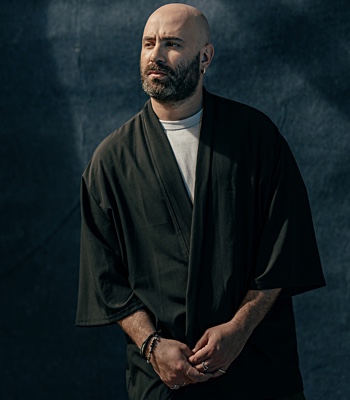John Moreland doesn’t have the answers, and he’s not sure anyone does. But he’s still curious,basking in the comfort of a question, and along the way, those of us listening feel moved to askour own. “I don’t ever want to sound like I have answers, because I don’t,” he says. “These songsare all questions. Everything I write is just trying to figure stuff out.”Moreland is discussing his new album Birds in the Ceiling, a nine-song collection that offers themost comprehensive insight into the thoughts and sounds swimming around in his head to date.A compelling blend of acoustic folk and avant-garde pop playfulness, Birds in the Ceiling livesconfidently in a space of its own, enriched by tradition but never encumbered by it...
read more
John Moreland doesn’t have the answers, and he’s not sure anyone does. But he’s still curious,basking in the comfort of a question, and along the way, those of us listening feel moved to askour own. “I don’t ever want to sound like I have answers, because I don’t,” he says. “These songsare all questions. Everything I write is just trying to figure stuff out.”Moreland is discussing his new album Birds in the Ceiling, a nine-song collection that offers themost comprehensive insight into the thoughts and sounds swimming around in his head to date.A compelling blend of acoustic folk and avant-garde pop playfulness, Birds in the Ceiling livesconfidently in a space of its own, enriched by tradition but never encumbered by it. Thesongwriting that has stunned fans and critics alike since 2015’s High on Tulsa Heat remainspotent, while the sonic evolution that unfolds on the record feels like a natural expansion of 2020’sacclaimed LP5.The New Yorker, Pitchfork, Fresh Air, Paste, GQ, and others have embraced Moreland’smeditative songs, while performances on The Late Show with Stephen Colbert, CBS ThisMorning, NPR Tiny Desk Concert, and more have introduced Moreland to millions. And yet, whilethe Tulsa-based Moreland is grateful for the respect and musical conversation he’s now havingwith people around the world, he is also more focused on the idea of just talking to one person––or even himself. “Through the years, I’ve felt like I’m increasingly talking to myself in my songs,more and more,” he says. “Maybe in the past, I wasn’t aware of it, but now, I am. I think doing thathas helped me be less hard on myself, which makes you more generous and compassionate ingeneral.”That helps explain why even if Moreland is reaching out to someone else, there is no judgment.“I’m in the same boat with whoever I’m talking to,” Moreland says. Moreland’s songs do feel intimate––like overheard conversations or solitary meditations. “I wantto talk one-on-one to someone in a song,” he says. “I don’t want to address a group, really,because I think that’s when it’s easy to start pontificating––and it gets less honest.”On Birds in the Ceiling, Moreland’s singing contributes to the feelings of hushed intimacy.Wielding a warm, sandpaper soul voice, Moreland got used to singing loudly as he began playingin bars, fighting to be heard over chattering crowds. “When I first started singing, I was very self-conscious about it,” he says. “I think I tried to affect my voice more. Singing loud could be asecurity blanket sometimes. On the new album, on a lot of the songs I was definitely making aconscious effort to sing quieter––almost whisper.”Produced by Matt Pence and Moreland, Birds in the Ceiling is dynamic: a folk record that refusesto stay in its lane. It’s the second album for Pence with Moreland, who sees the former––a Denton,Texas-based engineer, producer, and drummer––as an ideal musical partner. “We have a lot ofthe same influences, and I have been really influenced by his bands,” Moreland says. “It feelsreally effortless
show less
















